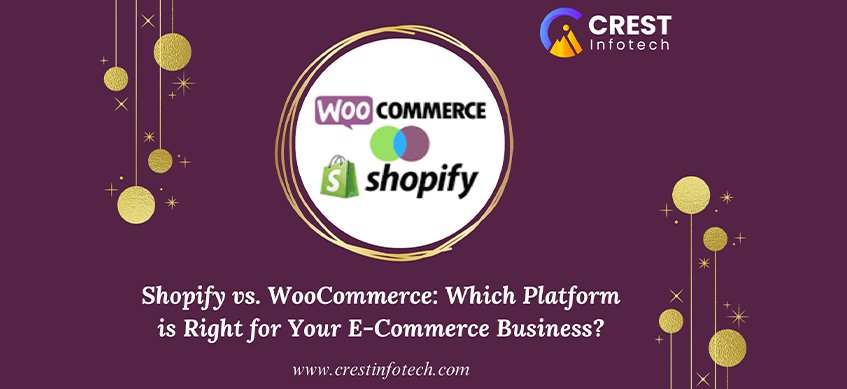When it comes to starting an e-commerce business, choosing the right platform is a critical decision that can impact the success of your online store. Among the top contenders are Shopify and WooCommerce, two of the most popular e-commerce solutions available today. Both platforms have their strengths and weaknesses, and the choice between them depends on various factors like budget, technical expertise, and business requirements. This article compares Shopify and WooCommerce across key metrics to help you determine which platform is best for your e-commerce business.
1. Ease of Use
Shopify: Simplified, All-in-One Platform
Shopify is a fully hosted platform designed for simplicity, making it ideal for beginners and those who don’t have technical expertise. From setting up your store to managing products and processing payments, Shopify offers a streamlined experience with minimal technical involvement.
- Pros: Shopify handles hosting, security, and updates, making it a hassle-free solution. The intuitive drag-and-drop interface allows users to create professional-looking stores without coding knowledge.
- Cons: The customization is somewhat limited unless you are familiar with Shopify’s Liquid coding language.
WooCommerce: Highly Customizable but Technical
WooCommerce is a plugin built on top of WordPress, providing full control over every aspect of your online store. It offers greater flexibility and customization options but requires more technical know-how, especially when it comes to managing hosting, security, and plugin updates.
- Pros: WooCommerce is highly customizable and works seamlessly with WordPress, which is great for those already familiar with the platform.
- Cons: You are responsible for managing hosting, security, and updates, which can be overwhelming for beginners.
Verdict: If you want simplicity and ease of use, Shopify is the better choice. For those who value flexibility and customization (and are comfortable with technical tasks), WooCommerce might be the preferred option.
2. Cost
Shopify: Fixed Pricing Plans
Shopify offers tiered pricing plans starting at $39/month for the Basic Shopify plan, with additional fees for higher-tier plans. It includes hosting, security, and essential e-commerce features. However, Shopify also charges transaction fees unless you use Shopify Payments, its built-in payment gateway.
- Pros: Predictable pricing structure and no hidden fees for hosting or security.
- Cons: Transaction fees (2% for the Basic plan) unless you use Shopify Payments.
WooCommerce: Pay for What You Use
WooCommerce is a free plugin, but the total cost of running a WooCommerce store can vary depending on your needs. Since WooCommerce is self-hosted, you’ll need to pay for hosting, which can range from $10 to $50+ per month, as well as premium plugins for advanced functionality.
- Pros: The initial cost is lower, and you have more control over your expenses by choosing your hosting and plugins.
- Cons: Costs can add up as you pay for hosting, domain, SSL certificates, and premium extensions.
Verdict: Shopify offers a more predictable pricing model, while WooCommerce can be more affordable upfront but may become costly as your store grows.
3. Design and Customization
Shopify: Beautiful Pre-Made Themes
Shopify offers a wide selection of professional-looking themes, both free and paid, that are fully responsive and customizable. The Shopify Theme Store includes themes designed for various industries and niches, allowing users to quickly build attractive online stores.
- Pros: Themes are optimized for mobile devices and user-friendly. Customizations are easy through the built-in theme editor.
- Cons: Full customization may require familiarity with Liquid, Shopify’s templating language.
WooCommerce: Unlimited Customization with WordPress
WooCommerce leverages the power of WordPress’s vast library of themes and customization options. You can choose from thousands of free and premium WordPress themes, many of which are designed specifically for WooCommerce. For those with coding skills, WooCommerce provides limitless design possibilities.
- Pros: Full control over the design and layout of your store with access to a wide range of themes and plugins.
- Cons: Customization can be complex, especially for beginners, and may require CSS or HTML knowledge.
Verdict: Shopify is great for users looking for beautiful, easy-to-implement designs. WooCommerce offers more flexibility for those willing to put in the time for advanced customization.
4. Payment Options and Fees
Shopify: Wide Range of Payment Gateways with Fees
Shopify supports a variety of payment gateways, including Shopify Payments, PayPal, Stripe, and more. However, Shopify charges an additional transaction fee (2% for the Basic plan) if you use a third-party gateway instead of Shopify Payments.
- Pros: Easy integration with multiple payment options, and no transaction fees when using Shopify Payments.
- Cons: Extra transaction fees if you choose not to use Shopify Payments.
WooCommerce: Flexible with No Transaction Fees
WooCommerce supports a vast array of payment gateways, including Stripe, PayPal, and various regional options. Since WooCommerce is self-hosted, there are no additional transaction fees from WooCommerce itself, though you’ll still need to pay the standard fees charged by the payment gateways.
- Pros: No additional transaction fees from WooCommerce.
- Cons: Requires setting up payment gateways manually, which can be more complex.
Verdict: If you plan to use Shopify Payments, Shopify is convenient. WooCommerce offers more freedom and no additional transaction fees, but the setup may require more effort.
5. SEO and Marketing Features
Shopify: Built-in SEO Tools
Shopify includes essential SEO features such as customizable title tags, meta descriptions, and automatic sitemaps. It also integrates with various marketing tools, including social media, email marketing, and Google Ads.
- Pros: Easy-to-use SEO and marketing tools that work out of the box.
- Cons: Limited control over URL structures and other advanced SEO settings.
WooCommerce: SEO-Friendly with Plugins
As a WordPress plugin, WooCommerce benefits from WordPress’s SEO capabilities. With plugins like Yoast SEO or Rank Math, WooCommerce gives you full control over SEO elements like metadata, URL structures, and rich snippets.
- Pros: Superior SEO control with access to advanced SEO plugins.
- Cons: Requires some manual setup to achieve optimal results.
Verdict: WooCommerce, with its WordPress foundation, is better for advanced SEO control. Shopify provides a simpler solution for users who want basic SEO features without the need for additional plugins.
6. Support and Community
Shopify: 24/7 Dedicated Support
Shopify offers 24/7 customer support via chat, phone, and email. It also has a large knowledge base and community forum to help users with common issues. The platform’s dedicated support is one of its strongest points.
- Pros: Excellent, responsive customer support available at all times.
- Cons: Some advanced technical issues may require help from Shopify experts or developers.
WooCommerce: Community-Driven Support
WooCommerce is an open-source platform with a large user community. While WooCommerce itself doesn’t offer dedicated support, you can find plenty of resources, forums, and third-party developers to help with issues. Additionally, many hosting providers offer WooCommerce-specific support.
- Pros: Extensive online documentation and community forums. Many experts available for custom development.
- Cons: No dedicated support team, meaning users may need to rely on third-party assistance or troubleshooting.
Verdict: Shopify wins in terms of customer support, providing immediate help for users. WooCommerce’s support system is community-driven, which can be a pro or con depending on your needs.
Conclusion
Both Shopify and WooCommerce are powerful e-commerce platforms, but the right choice depends on your specific business needs:
- Choose Shopify if you prefer a fully hosted, all-in-one solution with minimal technical requirements. Shopify is ideal for small to medium-sized businesses that want a user-friendly interface and reliable support.
- Choose WooCommerce if you value flexibility, control, and customization, especially if you’re already familiar with WordPress. WooCommerce is perfect for businesses that want to scale, have specific design requirements, or need advanced SEO control.
By evaluating your budget, technical comfort level, and business goals, you can make an informed decision on which platform will best support your e-commerce growth.



